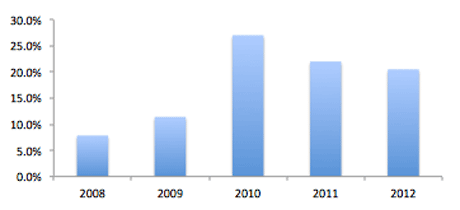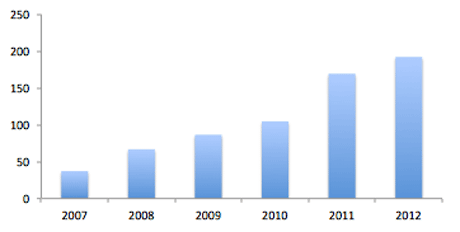Don’t buy Barratt – life is set to get harder for housebuilders
Housebuilder Barratt Developments has posted a good set of figures. But the stock carries a lot of risk, and profits could easily take a turn for the worse, says Phil Oakley.
Get the latest financial news, insights and expert analysis from our award-winning MoneyWeek team, to help you understand what really matters when it comes to your finances.
You are now subscribed
Your newsletter sign-up was successful
Want to add more newsletters?

Twice daily
MoneyWeek
Get the latest financial news, insights and expert analysis from our award-winning MoneyWeek team, to help you understand what really matters when it comes to your finances.

Four times a week
Look After My Bills
Sign up to our free money-saving newsletter, filled with the latest news and expert advice to help you find the best tips and deals for managing your bills. Start saving today!
Things are looking up for housebuilder Barratt Developments (LSE: BDEV). Half-year profits grew by 40%, and yesterday's full-year results showed that the trend had continued, with growth remaining strong.
A change of strategy has helped. Gone are the days when it was synonymous with making money by selling lots of flats, which saw it get badly burned in the housing market shakeout. Instead, Barratt has been very canny, snapping up land cheaply during the last few years.
At current prices, this allows it to sell better quality houses and still grow its profits. If selling prices don't fall a lot, and it uses more of this higher-margin land, then profits could continue to rise over the next year or two.
MoneyWeek
Subscribe to MoneyWeek today and get your first six magazine issues absolutely FREE

Sign up to Money Morning
Don't miss the latest investment and personal finances news, market analysis, plus money-saving tips with our free twice-daily newsletter
Don't miss the latest investment and personal finances news, market analysis, plus money-saving tips with our free twice-daily newsletter
But let's not get carried away. Trading profits are expected to be £191m for the year to June. That's a far cry from the £500m-plus the company was making at the top of the boom in 2007.
And the trouble is, it can only keep growing profits if it meets two conditions: it has to keep selling decent numbers of these sorts of houses; and house prices also need to at least stay where they are, or go up.
I wouldn't bet on either of these things happening. Here's why.
Shared equity schemes are artificially boosting demand
Whenever there's a debate about where UK house prices are going, more often than not, the bulls argue that demand exceeds supply, and so prices can only go higher.
I disagree. It's very easy to confuse demand' with want'. A lot of people want to buy a house, but if they can't afford one, then there is no demand. Houses are no different to fast cars or expensive jewellery in this respect. It's only because of low interest rates and careless bank lending that demand for housing soared during the boom the price that people could pay was boosted by cheap credit. Now that's no longer the case, so sales have fallen hard, even if prices haven't slid by anywhere near as much.
I find it bizarre that high food and oil prices are seen as bad for people, but high house prices are a good thing. Surely if people spend less money on housing they will have more money to spend elsewhere? That would be a good thing for the economy in the long run.
Of course, there's one easy way to increase demand for housing. And that's to let prices drop to affordable levels based on people's income. This would leave them with mortgage payments that can be met at much higher interest rates.
But if house prices fell hard, we'd quickly find out just how vulnerable the balance sheets of banks (not to mention consumers) remain. And that's not something the government is keen to confront.
So interest rates are set to stay at record low levels. And the government has found other ways to prop up the market, which takes us back to the house builders.
The taxpayer funds a number of schemes to help builders like Barratt step into the void left by the banks. Schemes such as NewBuy and FirstBuy are aimed at getting around the need for the big mortgage deposits that lenders now demand.
New Buy essentially forces the taxpayer to stand behind any losses incurred by lenders if things go wrong. FirstBuy involves the government and the housebuilder providing shared equity' of up to 20% of the value of a house - subject to certain criteria.
As you can see from the chart below, Barratt has increasingly relied on these shared equity schemes to shift its houses since the mortgage market became less generous. Shared equity sales account for over a fifth of total completions. For rival housebuilder Persimmon, it is as high as 26% of completions that's one in four sales.
Shared equity completions as % of total

Shared equity is very convenient for housebuilders. It allows them to make sales and book profits on houses that they might not have been able to sell otherwise. But by having a share of equity in the houses sold, they are increasing their exposure to house price risk. For example, Barratt booked £16m of impairment losses on its shared equity loans last year.
It's also convenient for the government, because it helps to prop up house prices by inflating demand. It stops the over-indebted banking system from facing another day of reckoning. In short, shared equity is creating a false market in parts of the new housing sector.
Barratt shared equity loans (£m)

Barratt now has £190m of shared equity loans on its balance sheet. That's significant, at nearly 10% of its tangible book value. If house prices fall further, then so will the value of these assets. The value of its land plots would probably fall too.
In other words, the company is becoming ever more dependent on the direction of house prices. Just how big a chunk of its balance sheet can shared equity assets occupy? My guess is that this cannot go on much longer.
Barratt is not a cheap stock
In short, Barratt shares still harbour lots of risks. That might not matter if they were cheap, but that's no longer the case. They trade on 17 times 2012 earnings, falling to 10.8 times if City forecasts for more profit growth are met. It trades on a 35% discount to its tangible book value, but this is justified, as its returns on capital remain very modest.
On that point, book value is often seen as a good way to value house builders. They have lots of short-term assets (land and part-built houses). But what figure should you use for book value? The accounts give you a snapshot on one particular day. For example, Barratt's 2012 book value will be based on net borrowings of around £170m.
However, a cash interest charge of nearly £60m, based on Barratt's current borrowing rates of 7.5-8%, suggests that average debt throughout the year is over £700m. That difference amounts to a reduction in book value per share of around 57p about a quarter.
In February, at around 140p, we advised taking profits on Barratt. We see no reason to change that view.
Get the latest financial news, insights and expert analysis from our award-winning MoneyWeek team, to help you understand what really matters when it comes to your finances.
Phil spent 13 years as an investment analyst for both stockbroking and fund management companies.
-
 Should you buy an active ETF?
Should you buy an active ETF?ETFs are often mischaracterised as passive products, but they can be a convenient way to add active management to your portfolio
-
 Power up your pension before 5 April – easy ways to save before the tax year end
Power up your pension before 5 April – easy ways to save before the tax year endWith the end of the tax year looming, pension savers currently have a window to review and maximise what’s going into their retirement funds – we look at how